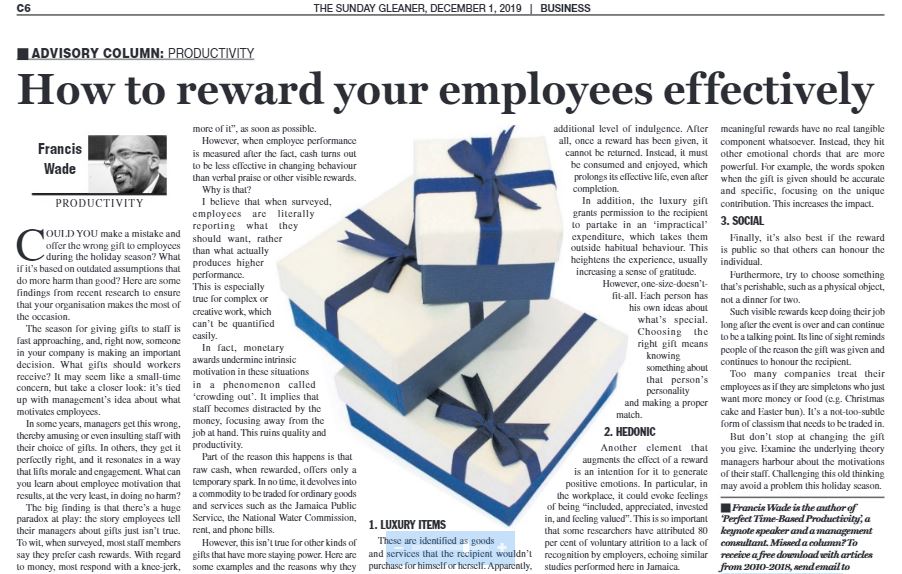Could you make a mistake and offer the wrong gift to employees during the holiday season? What if it’s based on outdated assumptions that do more harm than good? Here are some findings from recent research to ensure your organization makes the most of the occasion.
The season for giving gifts to staff is fast approaching and, right now, someone in your company is making an important decision. What gifts should workers receive? It may seem like a small-time concern, but take a closer look: it’s tied up with management’s idea about what motivates employees.
In some years, managers get this wrong, thereby amusing or even insulting staff with their choice of gifts. In others they get it perfectly right, and it resonates in a way that lifts morale and engagement. What can you learn about employee motivation that results, at the very least, in doing no harm?
The big finding is that there’s a huge paradox at play: the story employees tell their managers about gifts just isn’t true. To wit, when surveyed, most staff members say they prefer cash rewards. With regards to money, most respond with a knee-jerk, cultural reaction – of course they “want more of it”, as soon as possible.
However, when employee performance is measured after the fact, cash turns out to be less effective in changing behavior than verbal praise or other visible rewards.
Why is that?
I believe that, when surveyed, employees are literally reporting what they should want, rather than what actually produces higher performance. This is especially true for complex or creative work which can’t be quantified easily.
In fact, monetary awards undermine intrinsic motivation in these situations in a phenomenon called “crowding out.” It implies that staff becomes distracted by the money, focusing away from the job at hand. This ruins quality and productivity.
Part of the reason this happens is that raw cash, when rewarded, offers only a temporary spark. In no time, it devolves into a commodity to be traded for ordinary goods and services such as JPS, NWC, rent and phone bills.
However, this isn’t true for other kinds of gifts which have more staying power. Here are some examples and the reasons why they perform better than one-time cash rewards.
1. Luxury Items
These are identified as goods and services which the recipient wouldn’t purchase for him/herself. Apparently, the fact that the gift is a luxury allows an additional level of indulgence. After all, once a reward has been given, it cannot be returned. Instead, it must be consumed and enjoyed which prolongs its effective life, even after completion.
In addition, the luxury gift grants permission to the recipient to partake in an “impractical” expenditure which takes them outside habitual behavior. This heightens the experience, usually increasing a sense of gratitude.
However, one-size-doesn’t-fit-all. Each person has their own ideas about what’s special. Choosing the right gift means knowing something about their personality and making a proper match.
2. Hedonic
Another element which augments the effect of a reward is an intention for it to generate positive emotions. In particular, in the workplace it could evoke feelings of being “included, appreciated, invested in and feeling valued.” This is so important that some researchers have attributed 80% of voluntary attrition to a lack of recognition by employers, echoing similar studies performed here in Jamaica.
In this context, sometimes the most meaningful rewards have no real tangible component whatsoever. Instead, they hit other emotional chords which are more powerful. For example, the words spoken when the gift is given should be accurate and specific, focusing on the unique contribution. This increases the impact.
3. Social
Finally, it’s also best if the reward is public, so that others can honor the individual.
Furthermore, try to choose something that’s not perishable, such as a physical object; rather than a dinner for two.
Such visible rewards keep doing their job long after the event is over and can continue to be a talking point. Its line of sight reminds people of the reason the gift was given and continues to honor the recipient.
Too many companies treat their employees as if they are simpletons who just want more money or food (e.g. Christmas cake and Easter bun). It’s a not-too-subtle form of classism which needs to be traded in.
But don’t stop at changing the gift you give. Examine the underlying theory managers harbor about the motivations of their staff. Challenging this old thinking may avoid a problem this holiday season.

